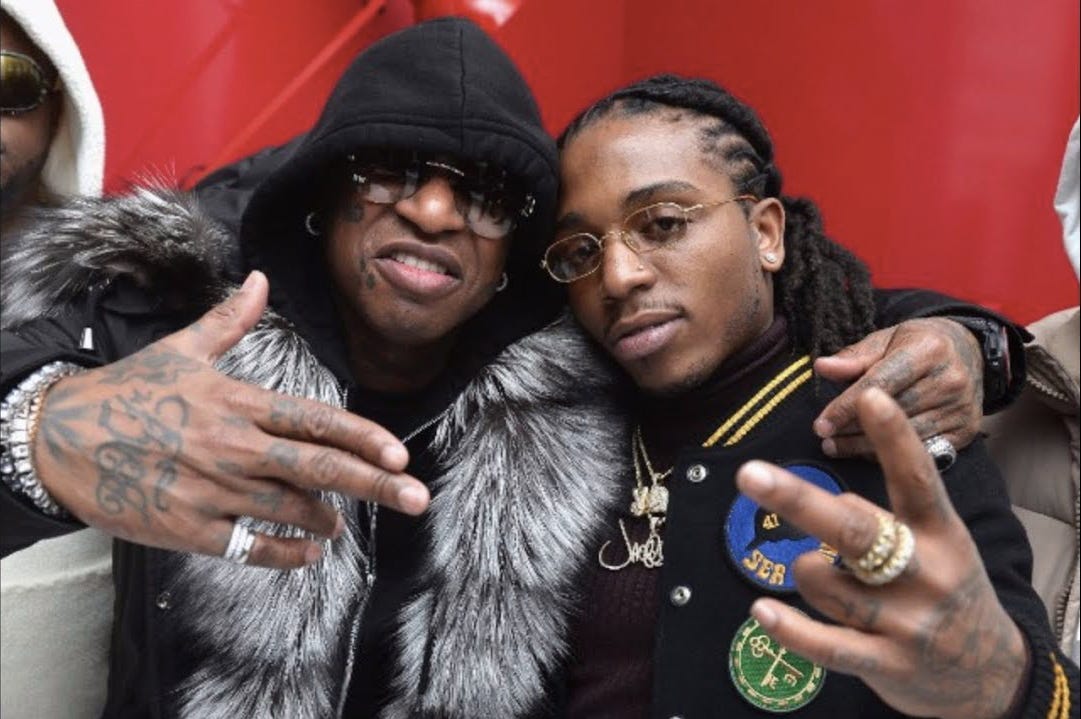Join the music execs, business leaders, and hip-hop fans who signed up for the Trapital newsletter!
Featured photo: Paras Griffin/Getty Images for BET
A couple of weeks ago, Jacquees kicked off his 4275 Tour. The self-proclaimed “King of R&B” had a busy December leading up to this. His bold statements rubbed Keith Sweat the wrong way, brought the 90s and 2000s R&B singers out of the woodwork, and dominated the discussion on Black Twitter. The 24-year-old was ready to cash in on all that earned media and recognition. This was designed to be his breakout moment.
Unfortunately, this tour wasn’t it. His venues are the same size ~1,000 capacity music halls that his 2016 “Mood” tour was in. But that tour had 30 shows, eight more than this current one. Since tickets prices are roughly the same range as before ($25-40), Jacquees will likely earn 25% less money this time around. And despite initial reports, it’s unclear whether Jacquees got a truly significant spike in music streams.
The Cash Money Records artist will have to go back to the drawing board. Trolling was not the meal ticket it has been for other artists. The strategy has its holes.
J. Cole would be delighted to hear this. Here’s a segment from his interview with Angie Martinez in May 2018:
“These kids have figured something out… they’ve figured out that attention is all that matters. The skill? The quality? [Who gives a] fuck about quality… This music is just a platform for [them] to get attention, and what’s even more important than the music is the shit that [they] do outside of the music.”
The 33-year-old rapper is referring to Lil’ Pump, Tekashi 6ix9ine, and everyone who follows their path. “These kids” create shock value and reap the immediate benefits. But a different strategy is required to drive ticket sales and become the king of a genre. Jacquees needs a new playbook.
Trolls can spark discussion, but they have a hard time controlling the narrative.
// Why Cash Money Records probably thought this was a good idea
Your boy Jacquees (via Hollywood Unlocked)
Jacquees signed with Cash Money Records in 2014, pledged his lifelong loyalty to the label in 2016, and hasn’t turned back. With Lil’ Wayne and Drake’s departure, Birdman is grooming the 24-year old singer to put the team on his back. The label wants ‘“Quees” to become the next Wayne. Mr. Carter, like Jacquees, made bold statements in his youth.
At 23, Wayne didn’t just call himself the best rapper alive—he made a song about it. By this point though, Birdman’s “son” had a few Ws to his name. The Hot Boys had made waves in the 90s. “Back That Azz Up” was an established anthem. And despite all those early accolades, Wayne still got clowned for his statement. Luckily for Wayne, Tha Carter II (2005) and Dedication (also 2005) built momentum for an epic run. He spoke his dreams into reality.
With Wayne’s journey and trolling’s popularity, it’s easy for Cash Money to believe that this was the best model for Jacquees. But these are wrong assumptions to make for two reasons.
First, despite Jacquees’ now heightened awareness, he’s not Wayne in 2005. Not even close. I can’t refer to him as “the [insert popular Jacquees song here] singer” because most of you don’t know an original Jacquees song. “Ol’ boy who covered ‘Candy Rain’” doesn’t have the same ring to it. He might get there someday, but today ain’t that day. Conversely, Lil’ Wayne rose to the top despite his comments, not because of them. Those statements helped Wayne build self-confidence, but his music spoke for itself.
Second, trolls can spark discussion, but they have a hard time controlling the narrative. Most of last month’s “King of R&B” tweets were about who the actual king is. There was little discussion about the discovery of Jacquees’ music. Rappers who have perfected trolling understand its benefits and limitations.
Birdman and Jacquees. Could they really be the next Like Father, Like Son?? (via YouTube)
“The Pump Plan” build influencers, but not legendary artists
Lil’ Pump’s record label, Inzei Records, executed “The Pump Plan” to help the rapper build his career. According to Lauren Levy at Vulture:
It’s a ten-step program that guarantees transforming a local rapper or minor celebrity into a meme and then a viral sensation using a set of proven marketing tricks. It includes tactics like: social-media influencer campaigns, meme-ing the artist, Musical.ly placements, World Star promotions, and something called “controversy projects,” which seems to mean planting feuds between artists and igniting drama to stoke controversy and online attention. They pitch it to new artists they’re looking to sign.
This plan reinforces J. Cole’s statement. Rap is a mere platform to expand to other opportunities: sponsorship, branding, and other business ventures. The goal is to become an influencer. The Pump Plan is a playbook to become the next Logan Paul, not the next Kendrick Lamar.
But the core elements of The Pump Plan are nothing new in hip-hop. Back in 1999, 50 Cent trolled any and everybody to get notoriety. Once he elevated his platform, he pivoted to focus on everything except music: Vitamin Water, Effen Vodka, POWER, trolling Wendy Williams, the list goes on. It’s why he feels a kinship with Tekashi 6ix9ine, who has become his protégé.
Soulja Boy did the same. Big Draco used his “Crank Dat” fame to put his energy into other ventures. He started a fashion line, had a brief acting stint, partnered with a gambling company, and launched a video game console. This week’s Breakfast Club interview was textbook Soulja Boy. His buzzworthy statements and hilarious soundbites were all promotional tactics to support his business pursuits.
The game hasn’t changed. Social media and SoundCloud have just reduced the friction for today’s rappers to achieve what 50 and Soulja Boy took years to build.
The path to becoming the best rapper alive or King of R&B is much more traditional and linear. A hot mixtape leads to a commercial hit, which leads to guest features, a quality album, classics albums, and award-winning accolades. Wayne, Kendrick Lamar, Usher, and Chris Brown check almost all those boxes.
Jacquees has dreamed of R&B greatness since he was 13. He clearly loves the craft and wants to be one of the greats. But The Pump Plan won’t get him there. Cash Money needs to course correct.
A short clip from last year’s talk between J. Cole and Lil’ Pump. Cole asks Pump to explain why he made a song called “Fuck J. Cole.” (via YouTube)
// The Jacquees Plan?
Jacquees lacks the recognition of fellow R&B artists. The boy can sing, but 4275 sounds a bit dated. His cover songs are fine, but he needs to be known for his own music. Young R&B artists like H.E.R., Daniel Caesar, and Khalid were all recognized for critically acclaimed work in 2018. If Jacquees wants to be the king, he has to be in that conversation.
His biggest crutch is a reliance on well-known guests artists. 4275 was littered with household names. Meanwhile, H.E.R., Daniel Caeser, and Khalid had barely any guest features on their albums. Jacquees next album should be 13 tracks or less with no else but him.
If Jacquees still wants to collaborate, it should be on other artist’s songs. The next time DJ Khaled or Calvin Harris make a compilation album, Jacquees should get a couple of features. He needs the hooks that Bryson Tiller has gotten for the past few years.
Once Quees’ music is in a better spot, he needs to elevate his platform in a helpful way. In November, I suggested that Cash Money should start a music festival:
Birdman should take a page from [Drake’s] book and launch a Cash Money redemption music festival in New Orleans. He should invite all the artists he’s had ever had disputes with to perform. And yes, it should be a festival, not a concert. He’s had issues with enough artists to fill a day’s lineup at Bonnaroo.
The intention was different, but it can benefit Jacquees too. The tour would generate a considerable buzz—the right kind of buzz. Jacquees can be a signal of Cash Money’s ability to nurture its newer talent in a more responsible way.
In 2019, expect more artists to follow The Pump Plan. It has made its way through the music industry. Some record labels are pivoting to help artists navigate branding and exposure opportunities. If an artist’s primary goal is to be an influencer, then it makes more sense. But if the artist wants to be in the discussion for Top Five Dead or Alive, King of R&B, or any other proclamation of greatness, it’s less impactful.
J. Cole would be happy to hear that Jacquees’ ideal next move is a page from his book. Remember, Cole’s early albums were flooded with guest features. But then he dropped 2014 Forest Hills Drive and went platinum with no features. Maybe we should start calling that the The J. Cole Plan.











